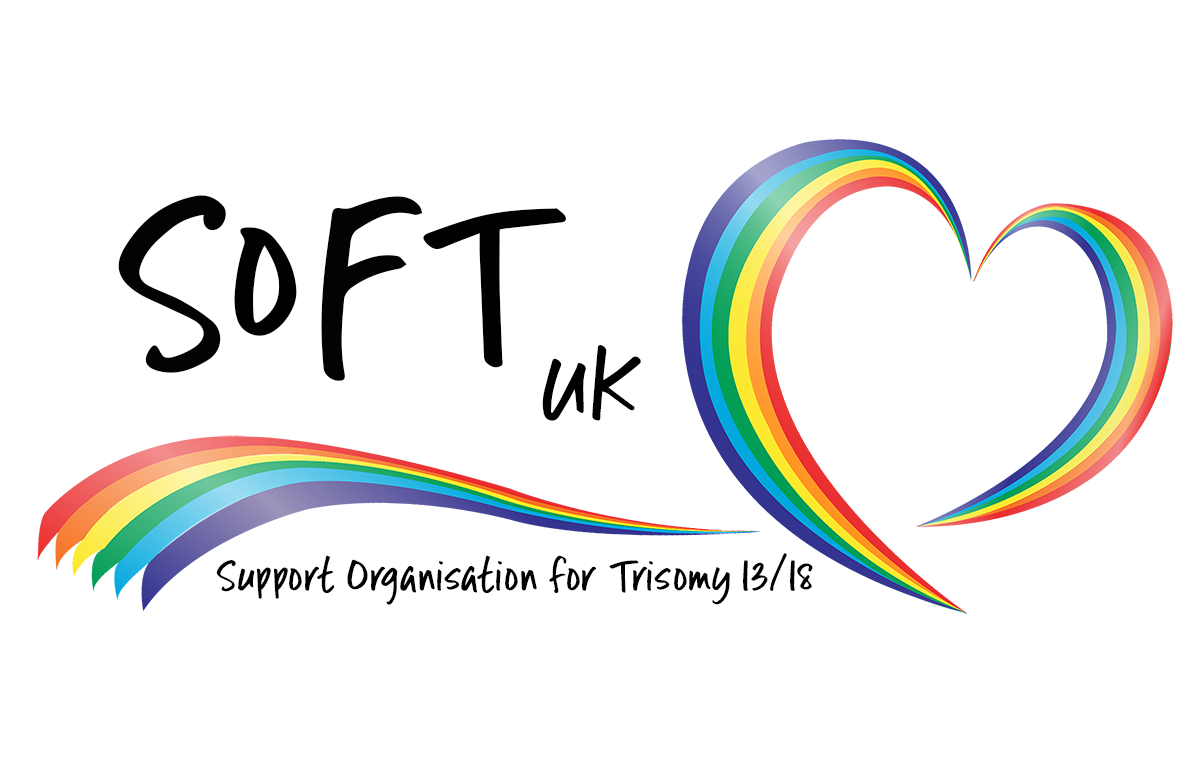Grief and loss – even when your child is alive
After Cali’s diagnosis, and the grim predictions that were made about her life expectancy, I went through an intense period of grieving. But it’s only now, eight years into our lives together, that I am understanding how feelings of grief and loss continue to plague me. I’ve also come to realise that my grief, and the unspent emotions I carry, are a large part of why I am often exhausted and struggle to be light-hearted. In this blog I am going to talk about the different types of loss and grief we face as parents of surviving children.
I hope it goes without saying that I’ll only be speaking of the experiences that arise from being the parent of a child with a life limiting condition that is still alive, and I am in no way comparing them to the experiences of somebody who has lost their child.
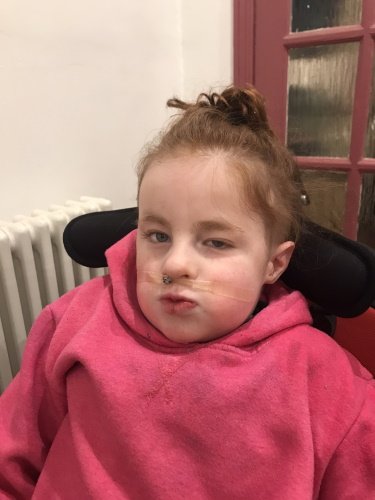
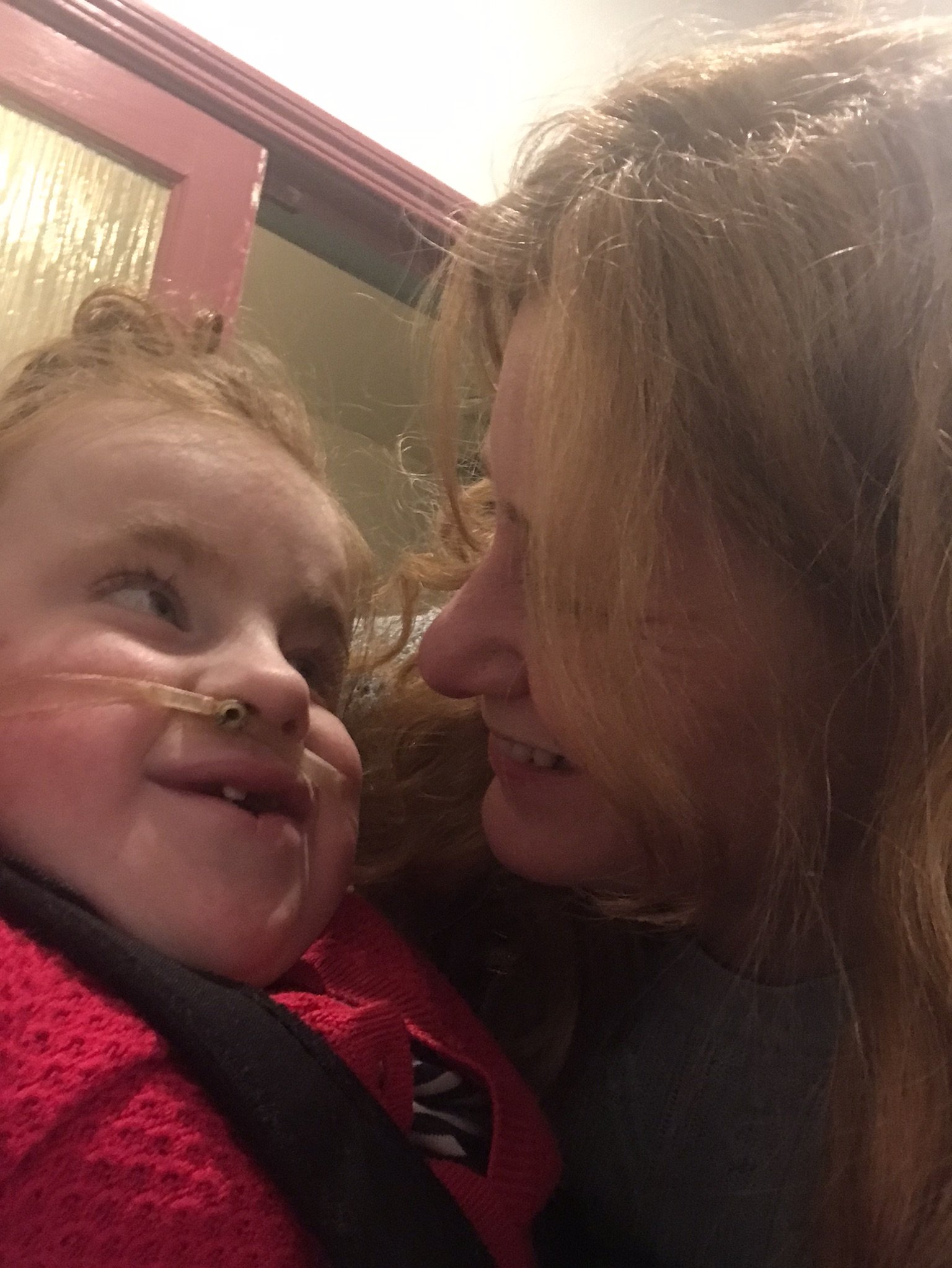
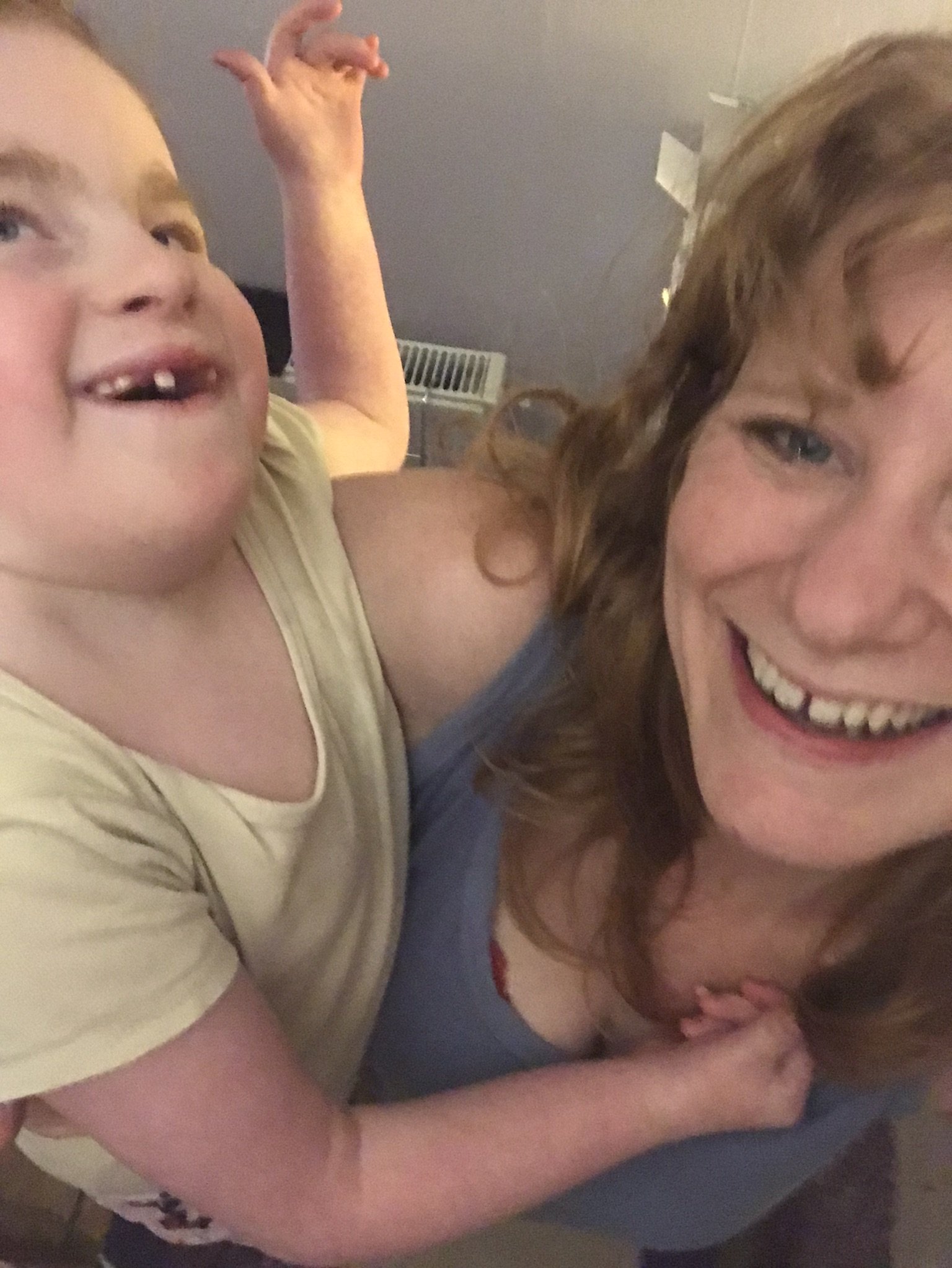
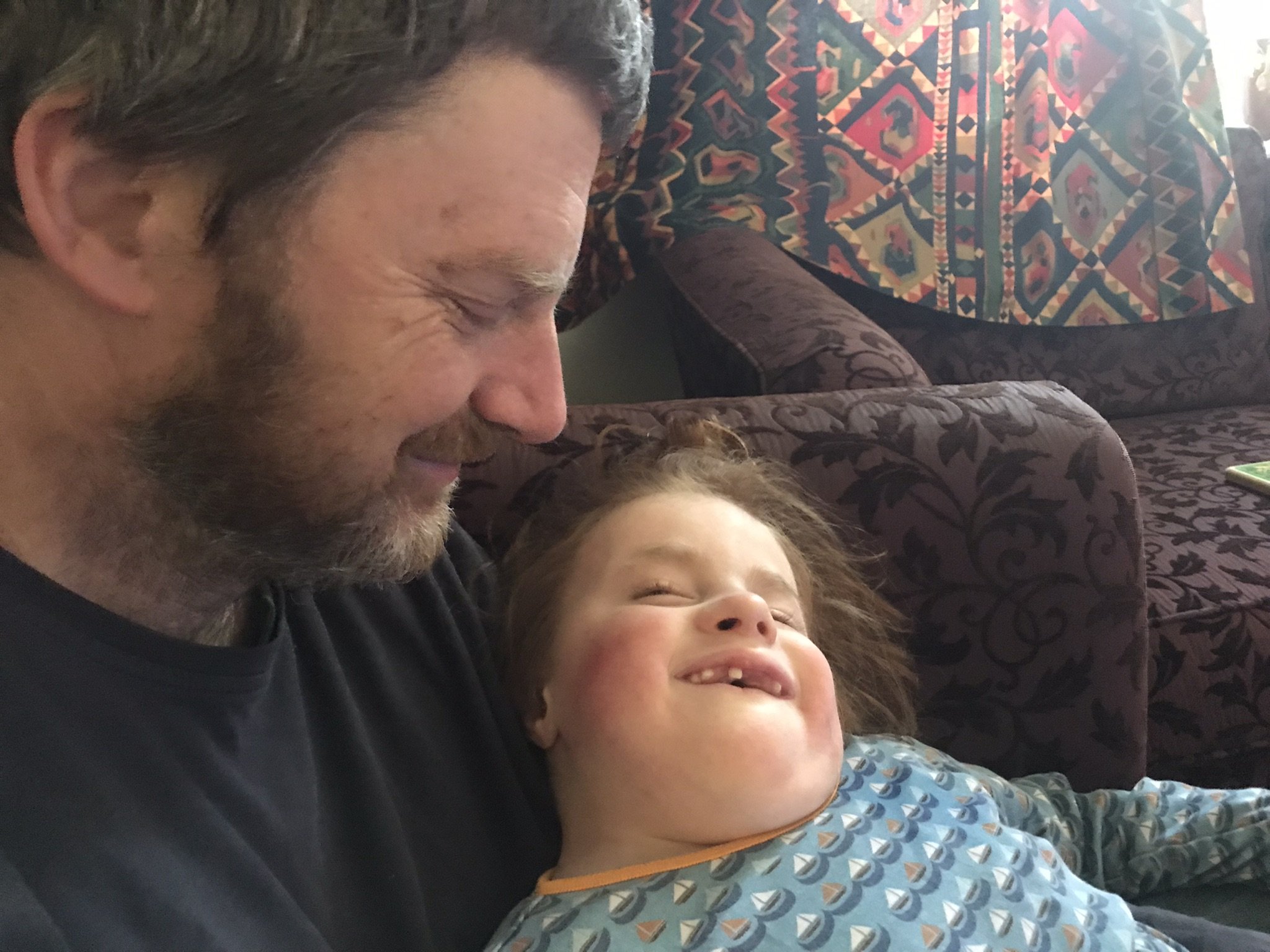
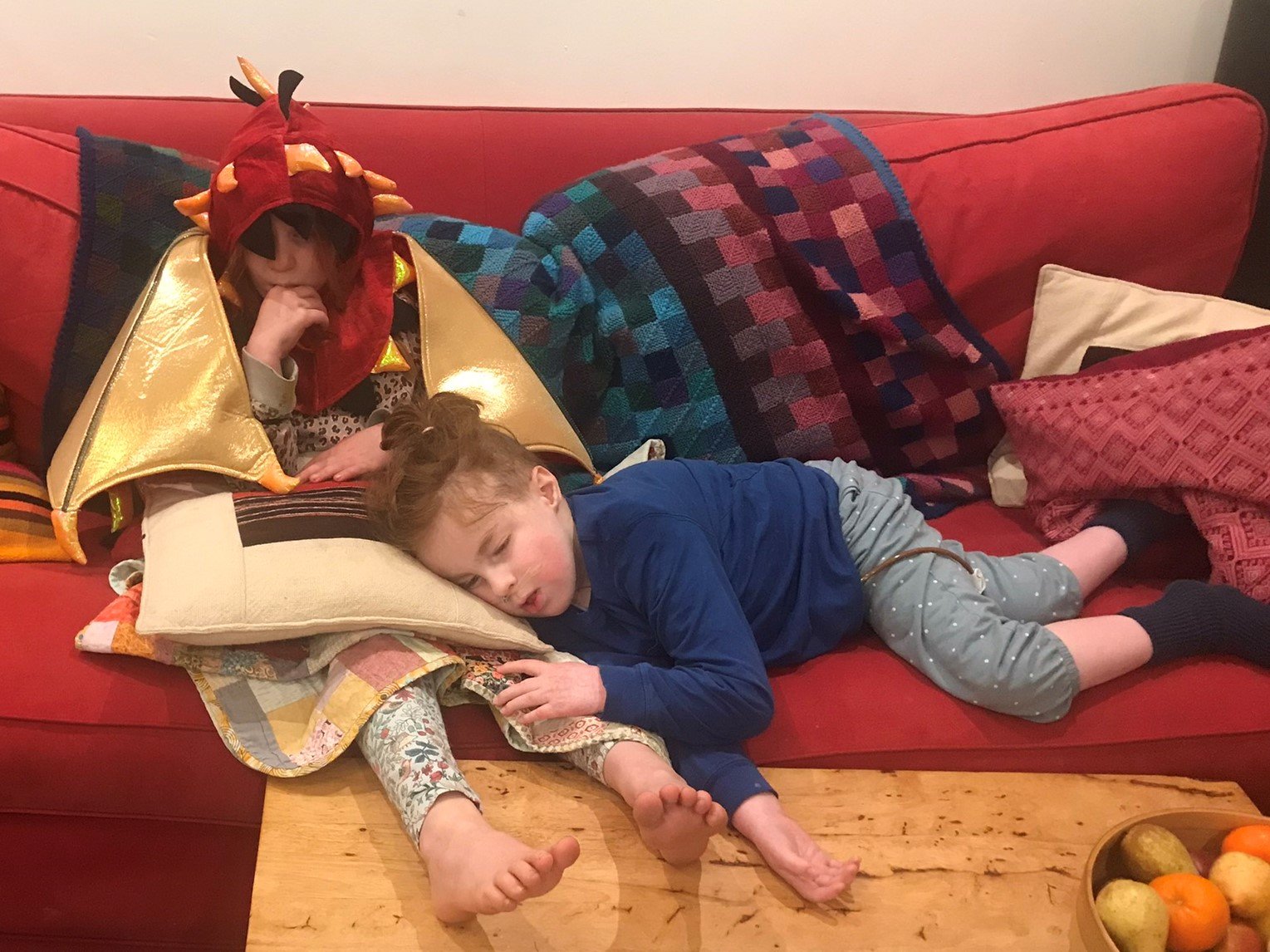
The Things We Grieve
Once the wild grief of being told my child was unlikely to survive her first year began to calm, I started to become aware that I also needed to grieve the child that I thought I was going to have. In my mind there lies an ‘alternative universe’ Cali. This is a Cali who can hop, skip, and jump, who reads to us after school, who taunts her sister, has play dates and is growing in independence with each passing year. This imaginary Cali pops out of the shadows now and then, especially when her peers reach a new milestone, reminding me that, in the life I thought I’d have, Cali would be reaching that milestones too.
I’m grateful that I mostly don’t dwell on alternative universe Cali, though occasionally I allow myself to daydream. Recently as I watched a friend’s 8-year-old chatting intelligently whilst nimbly creating a felt crown in an art club I was at with Alba, I allowed myself the fantasy that both my children were at this club. I permitted myself to imagine what that would be like, I wondered what chat Cali would be chiming in with and whether the three of us would cycle home together afterwards. And yes, I felt sad and wistful.
Two things soothe this grief for me. Firstly, that Cali herself is not grieving the things she can’t do. As she is content with her world, and is often delighted with her lot, this makes me happy. And secondly, whilst it’s inconvenient, challenging and limiting for me that Cali can’t do much for herself, I have no sense that I’ve been short-changed by the child I have been given. Cali is an incredible child; good company, funny and inspiring and I feel grateful to have her. So, although I often long for an easier life, as long as Cali is happy and well, I don’t spend much time wishing she herself was different. Most of what I would change about her would be her medical vulnerabilities, and her ability to sleep, of course.
Furthermore, the more I address my own inner ableism, the less acceptable it seems to me to concur with the pervasive attitude in society that having a disabled child is some kind of a calamity.
However, as Cali has gotten bigger, I’ve noticed a different feeling of bereavement. This is one that’s been creeping over me for the last year or so and it’s the grief of how Cali’s size is imposing further limitations on our lives, and making it even harder for us, as a family, to do the things other families can do.
I used to be able to run after Alba in the park with Cali in my arms and I used to be able to take them both to mainstream activities. Now our boundaries of play and adventure are dictated by wheelchair accessibility. The pandemic masked this for a while, but now the restrictions have been lifted I see other families spreading their wings and heading off the beaten track whilst we are depressingly stuck on the paved road.
Cali’s larger size impacts in other ways as well. I used to be able to scoop her out of the bath, but now I use a hoist. I can still carry her upstairs, just, but it’s hard work. I now limit how many times a day I move her because I worry for my back and my energy levels. It’s even getting harder to cuddle her.
This equipment we need to manage Cali’s non-mobility takes time to operate. Bath time takes an age with the ponderous hoists and dripping slings to contend with. This represents another loss – that of our precious time. The equipment takes up space and uglifies our house – more loss, more restrictions. And the more reliant we are on equipment, the harder it is to conceive of being far from home for too long, let alone overnight. It’s been years since we felt able to visit either Cody’s or my families with Cali due to accessibility issues. More loss again.
So, it’s not just grieving the things we’ve been missing out on since she was born, particularly the loss of the adventures we thought we’d have, I’m now also grieving the simpler life we had before Cali got big.
It’s worth saying at this point that this loss would be less profound if we lived in a more accessible world. How many times have I investigated a potential event or destination that claims smugly they have “something for everyone” or offer “fun for all the family”, only to discover that “everyone” does not include those that require wheelchair accessibility or a changing place. The social model of disability believes that people are only disabled by an inaccessible society, and not by their physical or cognitive differences. Perhaps if we lived in a world that valued and routinely considered the needs of disabled people this particular grief wouldn’t hit me so hard.
As I move through my 40s, I have also found myself mourning the people Cody and I were before we had Cali. Back then we felt more normal, we were more energetic and more hopeful. I imagine most people grieve their younger selves at times, but I do feel the experiences we’ve had parenting Cali have changed us in ways we’ll never recover from. We’ve lost our confidence in the future, and we’re worn out from years of broken sleep, problem solving and being overloaded with worries and things to do. We both feel isolated from a world that doesn’t understand the lives we live.
We have also both become more reticent to open up to others about our complex lives. Experience has led us to not to trust in people’s ability to respond helpfully to the challenges we face. Even when I do share with close friends, I rarely seem able to dive deep and explore things in a way that feels real. The gap between my normal and their normal feels too wide to breach, too much to explain. Amongst certain friends I rarely mention Cali, far less the impact of looking after her. I think I actually enjoy pretending to be like them at times. I tell myself they won’t understand, and this allows me to justify acting out an enjoyable fantasy that I have the life I thought I would have before Cali was born. This all adds up to another loss, the loss of connection, honesty and of being comforted by friends.
Certainly, there is also an upbeat paragraph to write about all the wonderful changes that eight years of parenting Cali has wrought upon me. Yes! I am wiser, more mature, more humane. I have become, even if I say so myself, incredibly organised and capable. I also have some niche talents, like being able to reliably turn the tap on long enough to allow exactly 62.5 mls of water to escape, for when I make up Cali’s Movicol. But I still grieve the optimistic people we were 8 years ago; I remember our dreams, our assumptions, the time we had to rest, the time we had to enjoy each other’s company.
The Future
The biggest grief of all, of course, is the grief still to come. For eight years there’s rarely been a day when I haven’t in some ways brushed against this. We live with the anticipation and dread of this day and what will follow.
This last year has seen Cali’s lungs deteriorate significantly. It used to be we only used an oximeter machine when she was unwell. But at some point, we realised her oxygen saturation had started to regularly plummet into the 70s when she was sleeping, and so the oximeter became part of the night-time routine.
Then we found ourselves using the “just-in-case” oxygen cylinder at night. At first occasionally, but then so regularly that an oxygen concentrator was ordered.
For some time, wafting oxygen near Cali’s face was sufficient to keep her oxygen saturations up, but following Cali’s last sleep study, which showed an alarming retention of carbon dioxide, we are moving her onto CPAP. When we questioned Cali’s consultant about what the new sleep study data indicated about Cali’s health, a painful conversation ensured.
And then Amy died. Amy was Cali’s surrogate big sister – an 11-year-old with full Trisomy 18 who was uncannily similar to Cali both in her medical vulnerabilities and her temperament. Both girls were April born, both were big sisters to bossy and vibrant younger sisters a couple of years their junior. Amy caught the Delta variant and was gone within a week. It is hard when any member of our small community dies, but it was devastating to lose Amy, who I felt I knew through the thousands of messages I exchanged over the years with her mum. Amongst many things Amy was our way marker, always three years ahead of Cali, showing me what was possible, allowing me some peace that my child could keep surviving.
Since Amy died, I have been back to feeling like I did in the first year or two of Cali’s life – that her time may be running out. Only now I have eight years of knowing Cali, eight years of deep love.
And so, we decided to meet with the doctors that know us best and look once more at our wishes for Cali at the end of her life. It feels like we need to be prepared. To my surprise it felt good to be practical and talk through the various possibilities, to realise there are things that we’d like written down so that when the time comes the medical professionals know what’s important to us. It was liberating to be able to talk about Cali’s death and shine a light into the darkest corners of our mind with people who had helped care for children like Cali at the end of their lives.
I assumed that it would take me a couple of days to restore my equilibrium after that meeting at the hospice, but in fact it’s been many weeks and I’m still reeling. Part of this is the busy life I lead, which has forced my grief to the margins just so I can keep on rolling with the constant demands of life. Maybe because it’s had no outlet, I’ve felt the grief invade my body, cooking up monumental levels of tiredness and irritability. It’s also affected my immune system, making a standard cold linger for weeks, and my throat often feel sore.
The fallout from the meeting has shown me just how much dread and sadness I hold without even realising it, and how much of it is safely tucked away behind some clever psychological defences which allow me to function and enjoy my life without being incapacitated by worry and grief. If I’m honest, the life in which Cali is no longer with us is just as abstract as my alternative universe Cali. Even now, when it seems like the dark clouds are gathering over our family, I am still carrying on as if everything is OK. Somehow, I’m unable to dwell on Cali’s occasional huge sats drops, her increasing carbon dioxide retention or her move onto CPAP. I might be much more aware of my heartache at the moment, but I also know the real howling grief is still to come. But it isn’t here yet, so we just keep making hay, even if the sun is not shining as brightly as before.
Living with Grief
How to manage this grief? Should grief even be managed? We often give each other the advice to let ourselves feel what we are feeling. But anybody who has a busy life, and children looking to you for care and stability, knows that if you can hold it at bay that often feels like the easiest and most practical option.
Though I do want to be able to find a way to feel more. It can help to occasionally rage at how life is getting more difficult. It is hard feeling restricted, having little time, feeling overloaded and feeling isolated. For example, I hate that I can no longer push Cali up the hill home from Alba’s school, which causes complications around the school run. And I want to scream “over my dead body!” at the calm technicians that suggest we put a through-floor-lift where our family-time sofa sits. There is a reality to the hardships that we face that needs airtime. Especially if, once a bit of bitter rage has been spent, you are able to make space for gratitude.
Gratitude is such a wonderful thing, so long as it is not forced out of a sense of guilt or obligation. It’s a gift that is automatically generated when something gets easier, or when you are reminded of all the ways that things could be harder. I also feel it when I acknowledge all the privilege and good fortune we’ve received as a family since Cali was born. And as long as I am in contact with gratitude, I am always able to feel some level of positivity.
And as ever, when the worries and sadness mount up, Cali’s unhurried appreciation of the world is always there to help me back to the safety of the present moment. She helps me slow down and to enjoy the drone of the hoist, the rituals of the WAV. Putting Cali to bed might take an hour, but in recent years I’ve stopped hurrying this part of the day because it is when Cali is often at her happiest as she delights in the familiarity of the routine. That hour is an opportunity for closeness and for mindfulness as I move through the lengthy nocturnal ceremonies.
There is a Japanese expression ‘Mono No Aware’, which refers to the awareness of impermanence - that feeling of deep sadness that comes from knowing that everything in life will end or transform into something else. Loss is all around us; in every change that occurs, in every birthday celebrated, in every pair of child’s shoes outgrown. Or, as the Christian tradition puts it, “even in life we are in death”. Life with a medically fragile child often fills me with a sense of mono no aware, and I don’t begrudge this feeling. I believe allowing ourselves to feel the sadness alongside the joy, and to understand that they are two sides of the same coin, only makes us softer, kinder, more responsive people.
Tonight, I finally felt ready to scrape out the contents of the marmalade jar that had been lurking at the back of the fridge since before the pandemic started. Visits from Cody’s wonderful mother, whose death, a year ago, often still feels too big for me to comprehend, was the reason we kept marmalade in the fridge. I’d kept the marmalade there because I couldn’t face the finality of knowing we’d never breakfast together again. But Cody is making a great vat of bramble jelly out of the blackberry’s that are currently in abundance, picked by him and Alba, and so he needed jars. I couldn’t help but notice that in this little step towards accepting Caroline’s death, I was freeing up the jar to live again and to be filled with sweet jam that will see our family through the next period of our lives.
